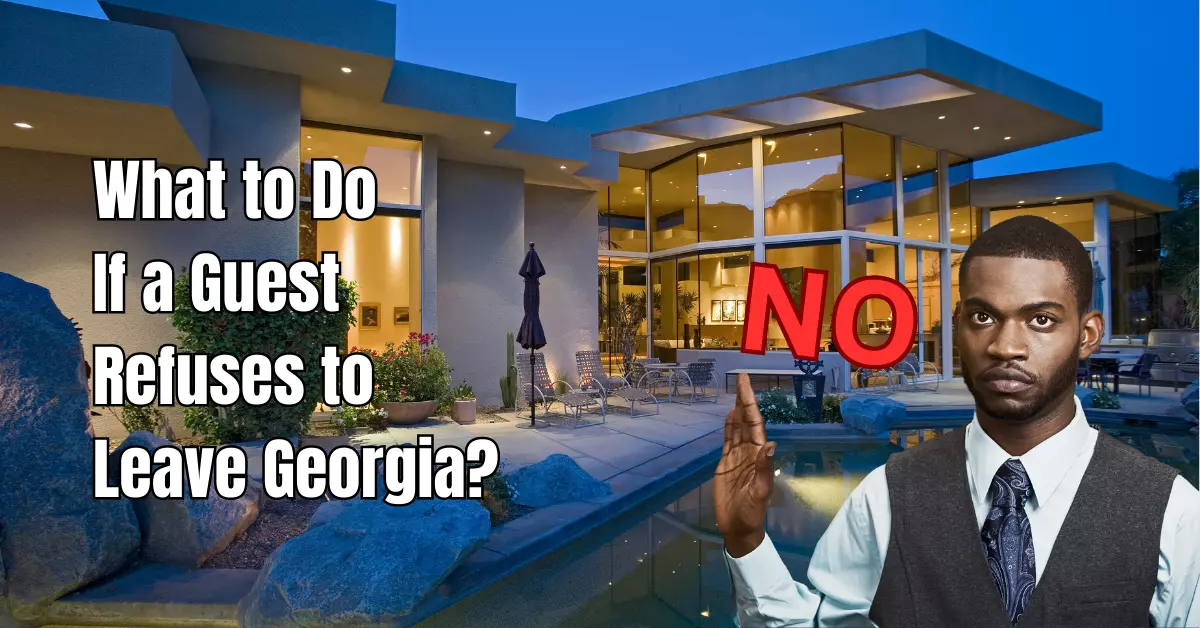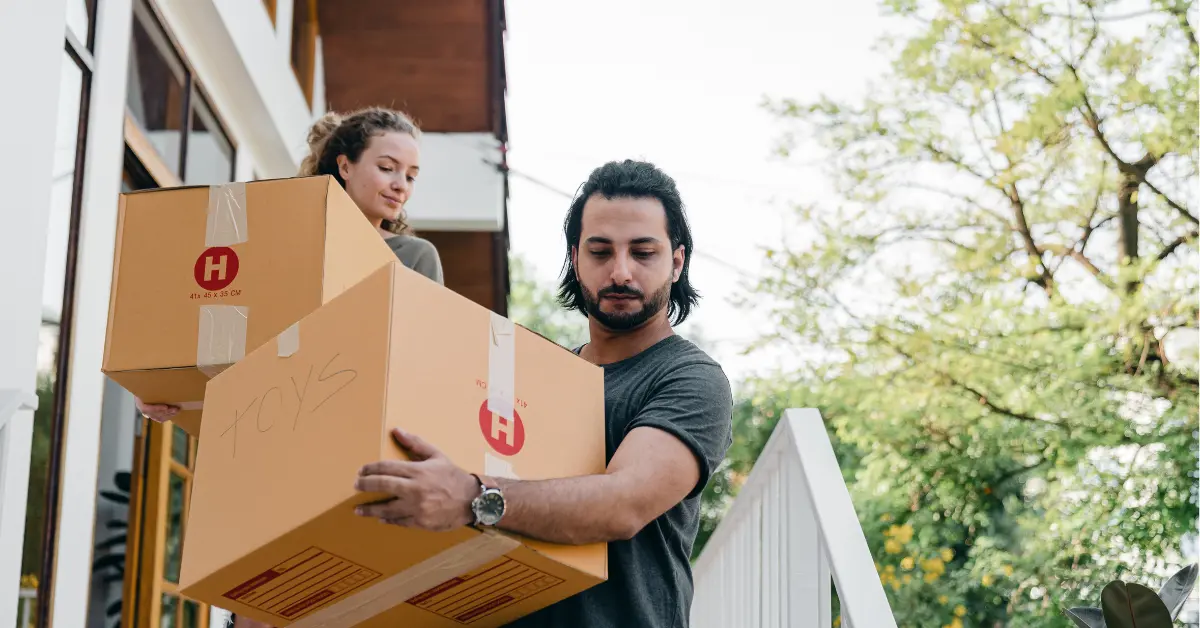What to Do If a Guest Refuses to Leave Georgia?
If a guest refuses to leave in Georgia, the owner or manager of the property must begin the legal eviction process. This involves filing a dispossessory action in court and serving the guest with a notice to vacate.
Failure to comply with the notice may result in law enforcement intervention to physically remove the guest from the property.

Understanding The Law And Your Rights As A Host
If a guest refuses to leave your property in georgia, it’s important to understand the legal options available to you as a host. Here’s what you need to know:
Georgia law recognizes two types of guests: Tenants and licensees.
Tenants are individuals who have established a legal right to occupy your property in exchange for rent payments. Licensees, on the other hand, are guests who have been granted permission to stay on your property but do not have any legal right to occupy it.
If someone refuses to leave your property, you may need to file for an eviction. Under Georgia law, eviction proceedings must be filed in the county where the property is located.
To file for an eviction in Georgia, you’ll need to provide the court with a written notice to vacate. This notice must be delivered to the guest in person or via certified mail.
If the guest fails to leave within the timeframe specified in the notice, you can file a formal claim for eviction with the court. This claim will be heard before a judge who will make the final decision on whether to evict the guest or not.
How To Determine Whether The Guest Is A Tenant Or A Licensee
Understanding whether a guest is a tenant or a licensee is essential to knowing what legal options are available to you in Georgia. Here are some key differences:
- Tenants have established legal rights to occupy your property in exchange for rent payments. This means that in order to remove a tenant, you must file an eviction and obtain a court order.
- Licensees, on the other hand, are guests who have been granted permission to stay on your property, with no expectation of payment. This means that if a licensee refuses to leave, you may be able to have them removed as a trespasser without going through an eviction process.

Applicable Legal Remedies And Consequences For Non-Compliance
If a guest refuses to leave your property in Georgia, there are several legal remedies available to you. These include:
- Filing for an eviction, which can result in a court order requiring the guest to vacate the property.
- Requesting a restraining order, if the guest becomes violent or threatening.
- Filing a lawsuit for damages, if the guest causes damage to your property or belongings.
It’s important to note that failure to comply with Georgia’s eviction laws can result in legal consequences for the host. These may include:
- Fines for violating eviction laws.
- Being held liable for damages suffered by the guest as a result of an improper eviction.
- Being sued by the guest for wrongful eviction.
Important Considerations For Protecting Yourself And Minimizing Risks
If you find yourself in a situation where a guest is refusing to leave your property in Georgia, there are several steps you can take to protect yourself and minimize risks. These include:
- Keeping detailed records of any interactions with the guest, including conversations, phone calls, and texts.
- Ensuring that you have a signed lease agreement with any tenants on your property.
- Consulting with an attorney to ensure that you are following appropriate legal procedures for eviction.
- Avoiding confrontations with the guest, and instead, relying on legal proceedings to resolve the situation.
- Contacting local law enforcement if the guest becomes violent or threatens you.
Steps To Take Before Asking A Guest To Leave
When hosting guests in your home, it’s essential to establish rules and expectations from the outset. However, in some instances, guests may refuse to leave even after their designated departure date.
In Georgia, it’s necessary to follow specific steps before asking an unwilling guest to vacate your premises.
Here are some crucial steps to take before that situation arises:

Communicating Expectations And House Rules Upfront
It’s always best to lay clear expectations and house rules before a guest arrives; communication is vital to ensure that a guest adheres to the agreed-upon terms. You can inform your guests of the following:
- Check-in/check-out times and dates.
- The maximum number of people allowed to stay.
- Pet policy.
- Smoking policy.
- Use of amenities like kitchen and common areas.
Notifying guests of these expectations and rules before they arrive enables them to make informed decisions and prevents any confusion or misunderstandings.
Recognizing Early Warning Signs Of Potential Issues
In some instances, it may not be immediately clear that a guest will become problematic. However, some early warning signs may indicate that a guest could potentially refuse to leave. Early warning signs may include:
- A guest consistently disregards house rules and expectations.
- A guest requested to extend their stay repeatedly.
- A guest demonstrating disrespectful or disruptive behavior towards other guests or your property.
- A lack of communication or effort from a guest to adhere to the agreed-upon terms.
Documenting Any Incidents Or Violations
In the event of a dispute, documentation of any incident or violation can provide vital evidence. If a guest violates the agreed-upon terms, you should document the violation immediately, including the following information if possible:
- The time and date of the violation.
- The nature of the issue.
- Any attempts made to resolve the issue.
- The names of any witnesses to the violation.
- Copies of messages or communication-related to the violation.
Evaluating Options For Resolving Conflicts And De-Escalating Situations
If any issues arise with a guest, your primary objective should be to resolve the issue before considering asking them to leave.
If a guest violates the agreed-upon terms, here are a few options to resolve conflicts and de-escalate situations before requesting they leave:
- Have an open and honest conversation with the guest about your concerns.
- Offer a compromise if you believe it may help to resolve conflict.
- Bring in a third-party mediator to help resolve any disputes.
- Consult with legal counsel if necessary.
Frequently Asked Questions On What To Do If A Guest Refuses To Leave In Georgia?
What Are The Legal Rights Of A Property Owner In Georgia If A Guest Refuses To Leave?
As a property owner in Georgia, you have the right to request law enforcement to remove the guest from your property if they refuse to leave after being told to do so.
What Can Be Done If A Guest Refuses To Leave A Property After Being Asked To?
If a guest refuses to leave a property after being asked to, the property owner can call the police and request that they remove the guest from trespassing.
What Is The Legal Definition Of Trespassing In Georgia?
In Georgia, trespassing occurs when someone intentionally enters or remains on someone else’s property without permission or lawful authority to do so.
What Are The Consequences If A Guest Is Found Guilty Of Trespassing In Georgia?
If a guest is found guilty of trespassing in Georgia, they may face criminal charges, fines, and even imprisonment, depending on the severity of the situation and the previous criminal record of the individual.
Conclusion
Navigating the discomfort of a guest who overstays their welcome can be tricky. But remember, your home is your sanctuary.
Georgia law empowers you to assert control – contacting authorities and issuing a formal eviction notice, if necessary. Equip yourself with knowledge and act confidently.